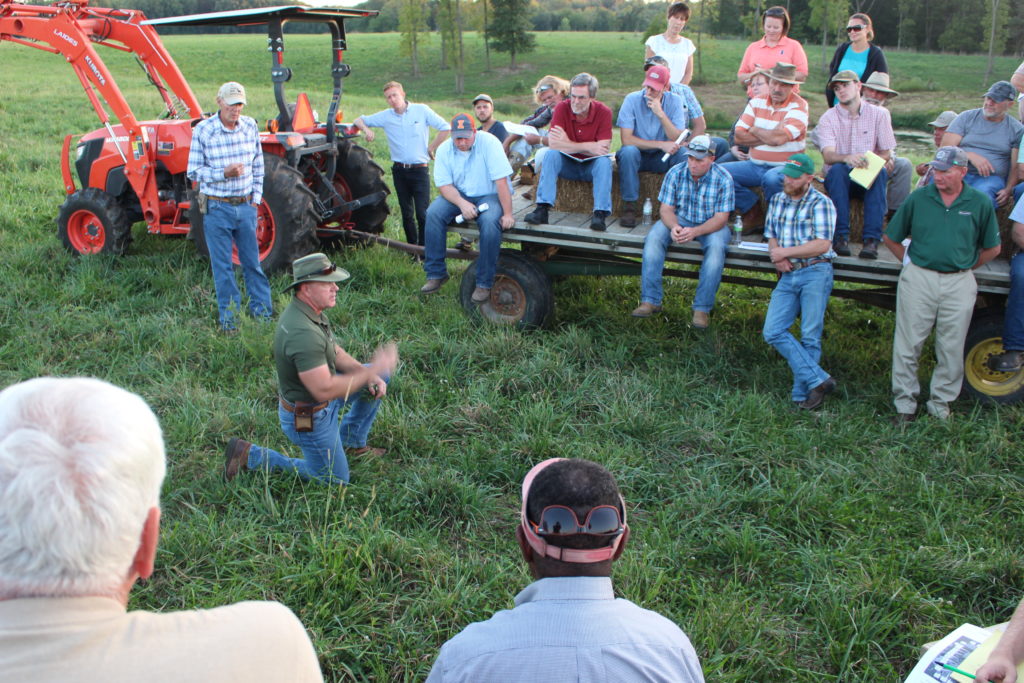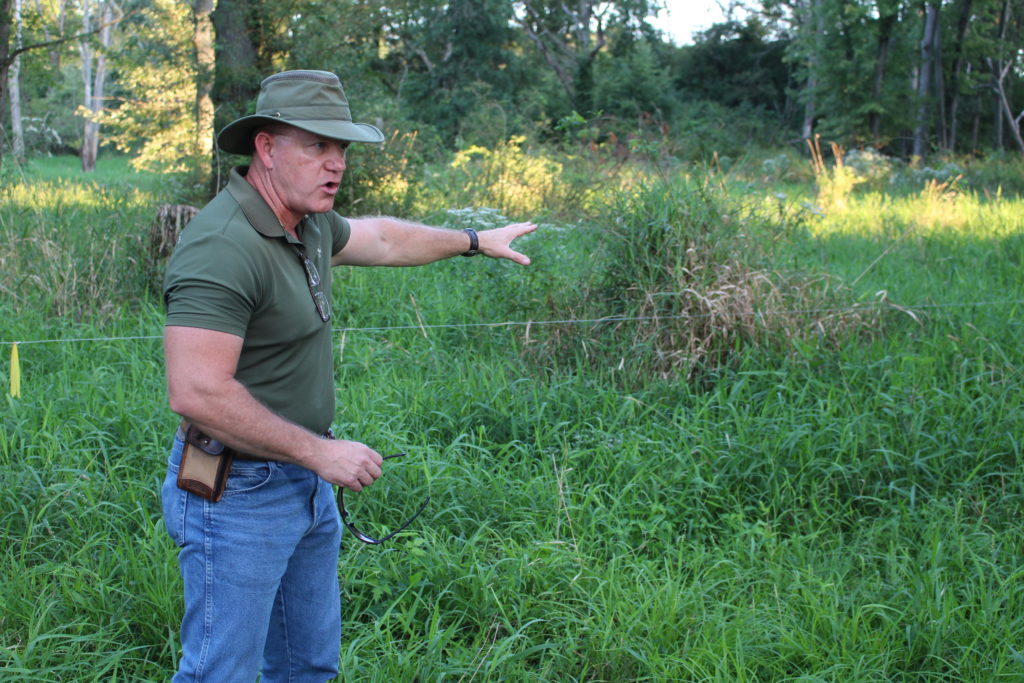I want to suggest that you add something a little different to your bucket list.
Before you die, be sure to attend a farm field day put on by a sustainable farmer.
Field days are usually geared for other farmers, but don’t let that scare you away. Field days are a chance to be immersed in the craft of farming with good, friendly people. You’ll see farming and the land in a new way.
This Tuesday, I made a one-day, eight-hour round trip to attend a field day at Trevor Toland’s River Oak Ranch in Macomb, Illinois that had been organized by The Pasture Project.
Despite the driving and the fact that I got home at 1:30 a.m., it was well worth it.
After some initial comments and presentations, more than 70 of us were carried around on hay wagons to different areas of Trevor Toland’s farm. He has been converting much of his 380+ acre farm on rolling land to a rotational grazing system for a number of years. At each stop, Trevor explained how he has been managing each section and how the grazing of cattle has been part of that management system.
Rotational grazing is the grazing of large numbers of cattle for short periods of time on small sub-sections of a farm. The cattle are then rotated onto the next small sub-section.
Each grazed subsection then has at least 30 days (and often more) to recover. This mimics what buffalo and other wild ruminants have been doing for millennia. It gives cows what they naturally desire to eat – grass and flowering plants (especially legumes) – and the chance to move around outdoors. Thanks to always being covered with a variety of plants that feed the microbes underground, the soil becomes full of life. That life is made even more rich by the occasional but intense pulses of dung, urine, and even saliva coming from the cattle herd. In addition, the action of their hooves stomps plant matter into direct contact with the soil where insects and microbes can work on it.
Continually adapting exactly how and where the cattle are grazed is a key element to this approach to farming.

Dr. Allen Williams (kneeling and imitating the partial consumption of a grass by a cow) explained how grasses and other pasture plants can persist and thrive when cows are allowed to eat only 50% before being moved to another field. Grasses and other plants that persist with healthy root systems can then feed the soil microbes in the ground while also shading the ground. Healthy microbial life is the key to healthy soils that feed plants and hold water.
Trevor, seen standing in front of the small tractor, is the best of what it means to be Midwestern. He’s direct, thoughtful, humble, and honest about his challenges. I later learned that he played basketball for the University of Iowa and was a principal before becoming a farmer.
The bonus feature of the event and the main reason I drove the many miles was that Dr. Allen Williams was the featured speaker. Before we actually got out into the fields, he presented an overview of rotational grazing using high densities of cattle. While out in the fields, he added insightful commentary at a number of our stops and answered questions..
A self-described “recovering academic,” Allen farms in Mississippi and is a tireless evangelist for rotational grazing across the country. A good introduction to him and rotational grazing is the Soil Carbon Cowboy video.
What’s especially interesting is that Allen is a Christian.
His faith in our Creator God is what motivates him to do what he does.
He speaks with passion, knowledge, and conviction. He helps his audience understand the complexities of how soil and animals interact. He carries himself with both decency and strength.

Dr. Allen Williams explained that it is helpful to maintain wooded sections of a farm. Cattle can be brought to the woods to cool down during hot weather. He noted, too, that you can tell when a pasture has microbes thriving in the ground by the degree to which insects and spiders are thriving above the ground.
As Christians, we should be proud of Allen and other Christians who are advancing Creation-friendly farming method with integrity and energy.
We should also support the kind of life-affirming, God-affirming farming he practices and helps thousands of other farmers implement.
You and your church can do that by buying meat that comes from animals raised the way Trevor Toland does at River Oak Ranch.
If you’re interested in attending a field day on a farm where sustainibility is a key principle, please email me at nathan@libertyprairie.org. I can share some good resources, depending on where you live. I wrote a post earlier about the commitment a whole faith church would make to having the food for its common meals come from sustainable, well-stewarded farms. I also wrote about the care with which whole faith churches need to communicate about farming ethics. Farmers are our neighbors.




